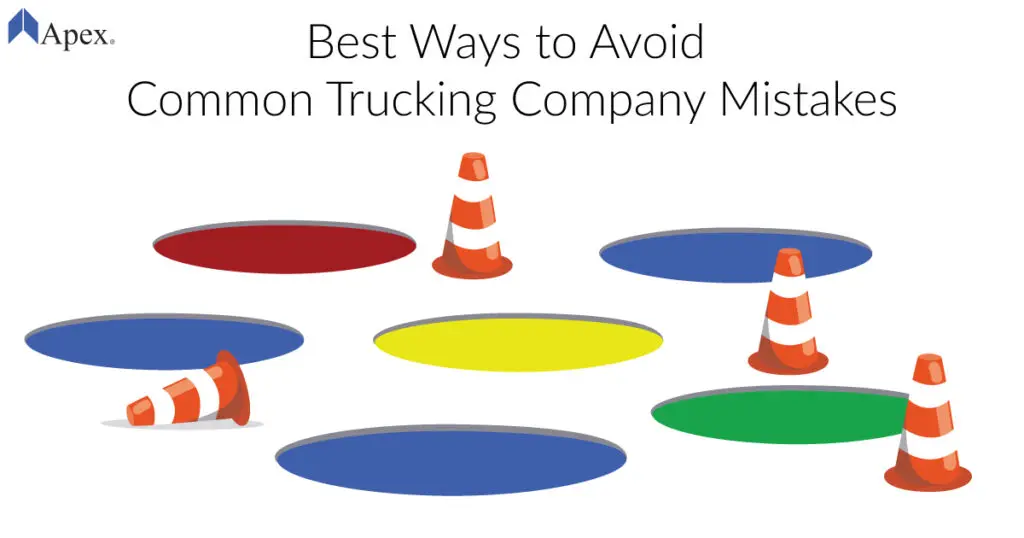Mistakes to Avoid When Starting a Trucking Company
Taking a leap of faith in a new career always comes with mistakes along the way. You’re green, so there’s a lot of trial and error as you learn the valuable lessons of your new business livelihood. But in the trucking industry, mistakes made while setting up your trucking company can be costly and time-consuming.
Time is money, so we have five experts from our Apex Startup Program here to tell you about the most common, costliest, and surprising mistakes they’ve seen after years of helping prospective business owners start trucking companies. Then Liz Sukhewatna, Kayla Gadberry, Josh Hill, Amanda Holland, and Theresa Ramos will tell you how to avoid those mistakes and start your trucking company ready for success.
What is the most common mistake people make?
Registering for more commodity types than necessary. There is typically no cost to update commodity types after registration, but many find it difficult, so they hire a company to fix it for them. Avoid this mistake by registering for the commodities you plan to haul instead of everything you might haul in the future. Insurance costs are also dependent on commodities hauled, so hauling certain commodities can cause the price of insurance to go up. – Liz
Misspellings. The entity name, owner’s name and address, Employee Identification Number (EIN), etc. – everything must match 100% except for punctuation. The EIN and Federal Motor Carrier Safety Administration (FMCSA) won’t allow commas or periods, which many carriers use in the entity name. It’s OK to have Kayla’s Trucking, LLC on the entity and Kayla’s Trucking LLC on the EIN and operating authority. But if you leave out one letter, you must file additional paperwork to fix the mistake.
Don’t be in a hurry. Give yourself at least three months to get everything ready, including your truck, insurance, and compliance items, before you start running. – Kayla
Ignoring the business side. Don’t just focus on what you know about trucking and driving. Brush up on some business basics, whether on your own or with your startup representative like one of us on the Apex Startup Program team. I see too many people get blinded by the “be my own boss” idea without realizing what that means. You are the boss, so now you must handle the “boss” part and the day-to-day tasks, too. Apex Capital can certainly help on the back-office side with factoring your freight bills, but even being aware of it upfront is a huge advantage. – Josh
Clerical Errors and Filing Out of Order. Because all your filing information must match exactly, the order of your filings is important. Common errors include the EIN filing not having the business identifier listed, like a Limited Liability Company (LLC), Corp, or Inc, or if they filed under the wrong entity type. If someone obtains an EIN before their business entity is formed with the state, they run the risk of the company name being rejected for being too similar to another one in the same state. Then you need to correctly refile anything that was originally filed using the rejected name. – Amanda
Wanting to do too much at once. If you are looking to be a brokerage, dispatcher, and carrier all at once, you are taking on too much. You would need a lot of capital for that, not to mention time. Try one thing first, then grow into your other plans. Building your enterprise slowly gives you a much higher chance of success. Also, brokers and shippers care about doing business with you when your authority is active, you’re paying insurance, and running. Many brokerages won’t give you a load unless your MC Number is 3-6 months old, however there are larger brokers that do offer loads to newer authorities. – Theresa
A Cautionary Tale: Don’t Wait Too Long
“I’ve seen carriers pay for an authority, and then intentionally wait months to get insurance, thinking that once they pay for insurance, they will be ready to get loads,” says Theresa. “However, they end up finding themselves in the same boat as other carriers who just got their authority activated 21-25 days from when they filed. They are still treated as new.”
What is the costliest mistake you’ve seen?
Registering for the wrong authority type. There are at least nine types of authorities included in the FMCSA authority application. If questions aren’t answered appropriately for what you plan to do with your company, you could end up with the wrong authority or multiple authorities. Each authority type costs $300, so it can become quite costly if too many types are added or if the wrong one is selected. Carriers will need to file an amendment to remove and add the correct authority type.
The FMCSA sometimes says they will reimburse costs when additional authority types are added by mistake, but most never see reimbursement. Insurance is also based on authority and can be more expensive if there are additional authority types listed. – Liz

Ownership changes. Some states do not show the owners of LLCs, but if your business entity is in a state that does and you want to add, remove, or alter an owner then you’ll need to file a Certificate of Amendment. The amendment to the LLC could be as much as $250. I would suggest not having more than 2-3 owners in one entity. – Kayla
Trying to go blind and doing it yourself. It doesn’t take but one or two mistakes to cost you the equivalent of what using a seasoned startup team, like the Apex Startup Program, might cost so you avoid mistakes from the get-go. Plus, not knowing the cost of insurance or equipment before starting the filings can create a “failure to launch” situation where you never really go active because of lack of capital. If you exceed the year timeframe of getting insurance, for instance, you may need to start the filing process over. That will cost you time and money. – Josh
Missing important steps in the process. If you don’t fulfill all your responsibilities, you can get penalized or fined and your authority can be revoked. This costs money to fix and takes up precious time. Also, it’s worth repeating that it’s important to anticipate the upfront costs and timeframes. Failure to obtain insurance and/or equipment after starting the filings seems to be a common problem. – Amanda
Another Cautionary Tale: Know the Details Ahead of Time
“I worked with a carrier who set up an LLC in a state he didn’t live,” says Theresa. “Once he had his authority, he realized he would need a foreign entity or to move the LLC to his home state. He formed a new LLC in his home state and dissolved the other LLC. That may be the only option as you cannot move an LLC in some states. The name for his new company started with a number. When he went to get his plates, his state did not allow for a company to have a name starting with a number. They do allow an LLC to start with a number, but not for plates. In that state, the starting number of the company name had to be spelled out to register plates. He had to go through the process of updating his company name for the LLC, EIN, USDOT Number, and MC Number. That is when he called me for help. But he still had not researched insurance. I let him know what to expect and he wasn’t prepared. So, he is just dissolving everything.”
What is the most surprising mistake you’ve seen?
Issues with addresses. The FMCSA uses the United States Postal Service (USPS) to notify and communicate with company owners. That means the FMCSA won’t accept a PO Box as a physical address and when company owners are listing a physical address that is not their own it can create problems. Additional research regarding physical addresses may be needed and this is only an issue depending on which state your entity is formed.
Carriers are now paying for a “virtual address,” which works because a carrier will pay a company to create a virtual address that is accepted through the USPS system and that company accepts mail on behalf of the carrier. Now the carrier can create an entity in any state. But this is only an issue if you live in a state where they require proof of residency to approve your International Registration Plan (IRP) for the vehicle plates. Make sure to check the state’s IRP & International Fuel Tax Agreement (IFTA) requirements so you have everything you need before registering the entity. – Kayla
You Get What You Pay For. Most people will recognize that purchasing the cheapest item is rarely, if ever, the best. But why is that logic forgotten when it comes to any sort of service – startup, factoring, etc.? You wouldn’t brag about getting the cheapest truck they had on the lot. I don’t understand why that same thinking wouldn’t apply to any services you are shopping for as well. We get a lot of calls for people that went with the cheapest setup they could find and it’s usually a mess to untangle the paperwork later. – Josh

State level filings. The states are all different, so they handle everything differently and want different things. I will sometimes be surprised when someone calls asking for help with the IRP for some random issue where that state wants something new. – Theresa
One More Cautionary Tale: Too Many MC Numbers
“I was very surprised when I received a call from one carrier,” says Theresa. “He told me he tried to get his MC Number on his own and ended up paying $600. This means he paid for two MC Numbers, say a brokerage MC Number and carrier MC Number. He only needed the carrier MC Number. He was concerned he did it wrong, so he refiled and paid another $600 for two more MC Numbers. That’s when he finally looked for help and called us.”
What is the best way to avoid mistakes like these?
All our Apex Startup Program experts had the same answer to this question – research, research, research! Add lots of planning to that as well. Here are some of their thoughts:
“Gather information for the entire process including filings, compliance items, insurance, equipment, and fuel costs,” says Liz. “Create a business plan, and if the startup process becomes too difficult, don’t be afraid to hire a startup company, like the Apex Startup Program team, to help you. This will ensure you have everything completed and filed correctly.”
“Do your due diligence and check out online reviews when searching for a startup team to help you or a factoring company to take care of your cash flow,” says Josh. “Also, ask around to other people in the industry. Focus on deeper questions than ‘What does it cost?’ But for sure do think of cost and have some rough numbers to put a budget together.”
“Always be prepared for worst case scenarios,” says Theresa. “Ask yourself these questions: What happens if my truck breaks down on my first load? If it takes me weeks to get paid on a load, how will that affect my ability to keep running? How can I pay my drivers? What happens if I plan to run this week, but things are delayed another week for my filings to be active? How will I find loads? What are my operating costs?”
Download our Trucking Business Plan Guide
Now that you know how to avoid costly and time-consuming mistakes, are you ready to start your trucking company? Let the Apex Startup Program help you make your dream a reality. Visit our website or call us at 855-369-2739.

